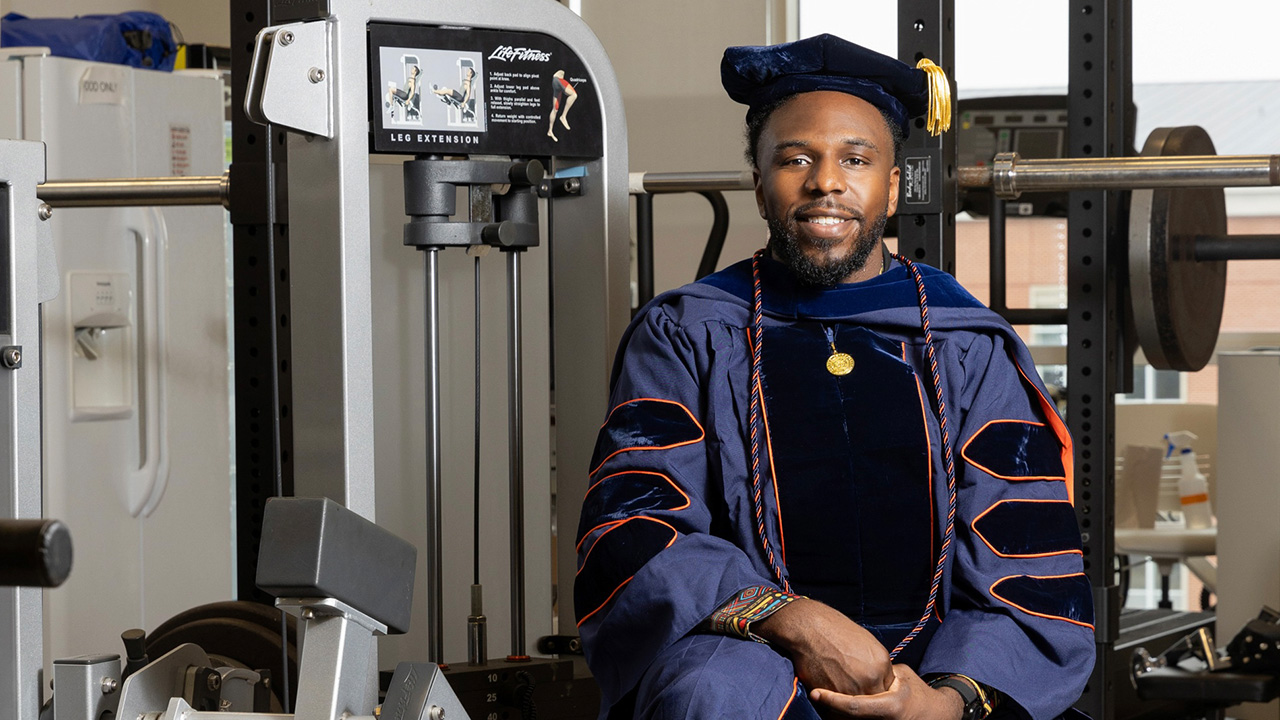content body
When Mason McIntosh started studying exercise science as an undergraduate, all he knew was that he had a passion for weight training and wanted to pursue it . Now, he’s found a love for improving health outcomes for aging adults.
“I didn’t know what I was doing was research,” he said. “It wasn’t until I got to Auburn for my doctorate that things clicked. Then I realized my real passion is in research.”
McIntosh, who is graduating with a doctorate from Auburn’s School of Kinesiology in August, began his undergraduate career playing football at Carthage College in Kenosha, Wisconsin, before transferring to Tennessee State University (TSU) to complete his undergraduate and master's degrees.
Though he’d never been a fan of academics, he was surprised to find himself engaged when a TSU professor tasked students with developing a feasible research project. McIntosh, who was working at a health supplement store at the time, developed a research question surrounding a popular product he saw customers purchasing.

McIntosh is graduating with a doctorate from Auburn’s School of Kinesiology in August.
The project developed into his master’s thesis, which led him to continue his work with supplements as a graduate research student in Auburn’s Nutrabolt Molecular and Applied Sciences Lab under Professor Michael Roberts.
McIntosh’s research focuses on how nutritional and training interventions impact muscular growth. He has received numerous accolades for this work, including Auburn's Graduate School Distinguished Dissertation Award and Presidential Graduate Fellowship, the National Institutes of Health Graduate Research Training Initiative for Student Enhancement Fellowship and the Porter Physiology Development Fellowship.
McIntosh hopes the impact of his work will improve the quality of life as we age.
“I would like for people to live happier, healthier and longer lives,” he said. “Western medicine is wonderful, and we live longer because of it. But what’s the point of living longer if we don’t also live happier and healthier?”
McIntosh’s favorite part of his research is the connections he makes with the people he works with.
“As a researcher, you work with participants for weeks at a time, so not only do you develop a researcher-participant relationship, but also a person-to-person relationship,” he said. “In my personal life, I’m pretty introverted, so having the opportunity to authentically and organically connect with people has been what I’m most passionate about.”
McIntosh views this people-centric approach to research as essential to providing the compassionate care needed to help people live happier and healthier lives.
As he prepares to walk across the stage, McIntosh has a few acknowledgements to make.
“I just want to give thanks to everyone who has brought me to where I am today,” he said. “I especially want to give thanks to my mentors who have challenged and pushed me.”
After graduation, McIntosh will move away from studying weight training for the first time in his career as a postdoctoral fellow at Arizona State University’s Hydration Science Lab.
“Auburn completely changed the trajectory of my life,” he said. “I came to Auburn with a passion for weight training and a desire to study that, but now I have a greater understanding of how much I don’t know. Now, I’m researching more general health outcomes and hopefully addressing some of those unknowns.”





